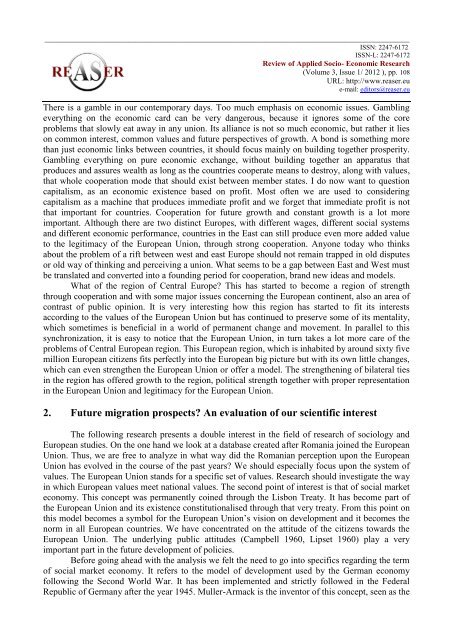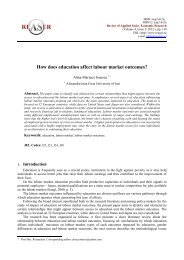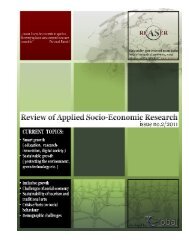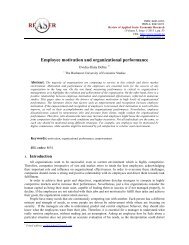Volume 3, ISSUE1/2012 - Review of Applied Socio-Economic ...
Volume 3, ISSUE1/2012 - Review of Applied Socio-Economic ...
Volume 3, ISSUE1/2012 - Review of Applied Socio-Economic ...
You also want an ePaper? Increase the reach of your titles
YUMPU automatically turns print PDFs into web optimized ePapers that Google loves.
________________________________________________________________________________________________<br />
ISSN: 2247-6172<br />
ISSN-L: 2247-6172<br />
<strong>Review</strong> <strong>of</strong> <strong>Applied</strong> <strong>Socio</strong>- <strong>Economic</strong> Research<br />
(<strong>Volume</strong> 3, Issue 1/ <strong>2012</strong> ), pp. 108<br />
URL: http://www.reaser.eu<br />
e-mail: editors@reaser.eu<br />
There is a gamble in our contemporary days. Too much emphasis on economic issues. Gambling<br />
everything on the economic card can be very dangerous, because it ignores some <strong>of</strong> the core<br />
problems that slowly eat away in any union. Its alliance is not so much economic, but rather it lies<br />
on common interest, common values and future perspectives <strong>of</strong> growth. A bond is something more<br />
than just economic links between countries, it should focus mainly on building together prosperity.<br />
Gambling everything on pure economic exchange, without building together an apparatus that<br />
produces and assures wealth as long as the countries cooperate means to destroy, along with values,<br />
that whole cooperation mode that should exist between member states. I do now want to question<br />
capitalism, as an economic existence based on pr<strong>of</strong>it. Most <strong>of</strong>ten we are used to considering<br />
capitalism as a machine that produces immediate pr<strong>of</strong>it and we forget that immediate pr<strong>of</strong>it is not<br />
that important for countries. Cooperation for future growth and constant growth is a lot more<br />
important. Although there are two distinct Europes, with different wages, different social systems<br />
and different economic performance, countries in the East can still produce even more added value<br />
to the legitimacy <strong>of</strong> the European Union, through strong cooperation. Anyone today who thinks<br />
about the problem <strong>of</strong> a rift between west and east Europe should not remain trapped in old disputes<br />
or old way <strong>of</strong> thinking and perceiving a union. What seems to be a gap between East and West must<br />
be translated and converted into a founding period for cooperation, brand new ideas and models.<br />
What <strong>of</strong> the region <strong>of</strong> Central Europe? This has started to become a region <strong>of</strong> strength<br />
through cooperation and with some major issues concerning the European continent, also an area <strong>of</strong><br />
contrast <strong>of</strong> public opinion. It is very interesting how this region has started to fit its interests<br />
according to the values <strong>of</strong> the European Union but has continued to preserve some <strong>of</strong> its mentality,<br />
which sometimes is beneficial in a world <strong>of</strong> permanent change and movement. In parallel to this<br />
synchronization, it is easy to notice that the European Union, in turn takes a lot more care <strong>of</strong> the<br />
problems <strong>of</strong> Central European region. This European region, which is inhabited by around sixty five<br />
million European citizens fits perfectly into the European big picture but with its own little changes,<br />
which can even strengthen the European Union or <strong>of</strong>fer a model. The strengthening <strong>of</strong> bilateral ties<br />
in the region has <strong>of</strong>fered growth to the region, political strength together with proper representation<br />
in the European Union and legitimacy for the European Union.<br />
2. Future migration prospects? An evaluation <strong>of</strong> our scientific interest<br />
The following research presents a double interest in the field <strong>of</strong> research <strong>of</strong> sociology and<br />
European studies. On the one hand we look at a database created after Romania joined the European<br />
Union. Thus, we are free to analyze in what way did the Romanian perception upon the European<br />
Union has evolved in the course <strong>of</strong> the past years? We should especially focus upon the system <strong>of</strong><br />
values. The European Union stands for a specific set <strong>of</strong> values. Research should investigate the way<br />
in which European values meet national values. The second point <strong>of</strong> interest is that <strong>of</strong> social market<br />
economy. This concept was permanently coined through the Lisbon Treaty. It has become part <strong>of</strong><br />
the European Union and its existence constitutionalised through that very treaty. From this point on<br />
this model becomes a symbol for the European Union’s vision on development and it becomes the<br />
norm in all European countries. We have concentrated on the attitude <strong>of</strong> the citizens towards the<br />
European Union. The underlying public attitudes (Campbell 1960, Lipset 1960) play a very<br />
important part in the future development <strong>of</strong> policies.<br />
Before going ahead with the analysis we felt the need to go into specifics regarding the term<br />
<strong>of</strong> social market economy. It refers to the model <strong>of</strong> development used by the German economy<br />
following the Second World War. It has been implemented and strictly followed in the Federal<br />
Republic <strong>of</strong> Germany after the year 1945. Muller-Armack is the inventor <strong>of</strong> this concept, seen as the








